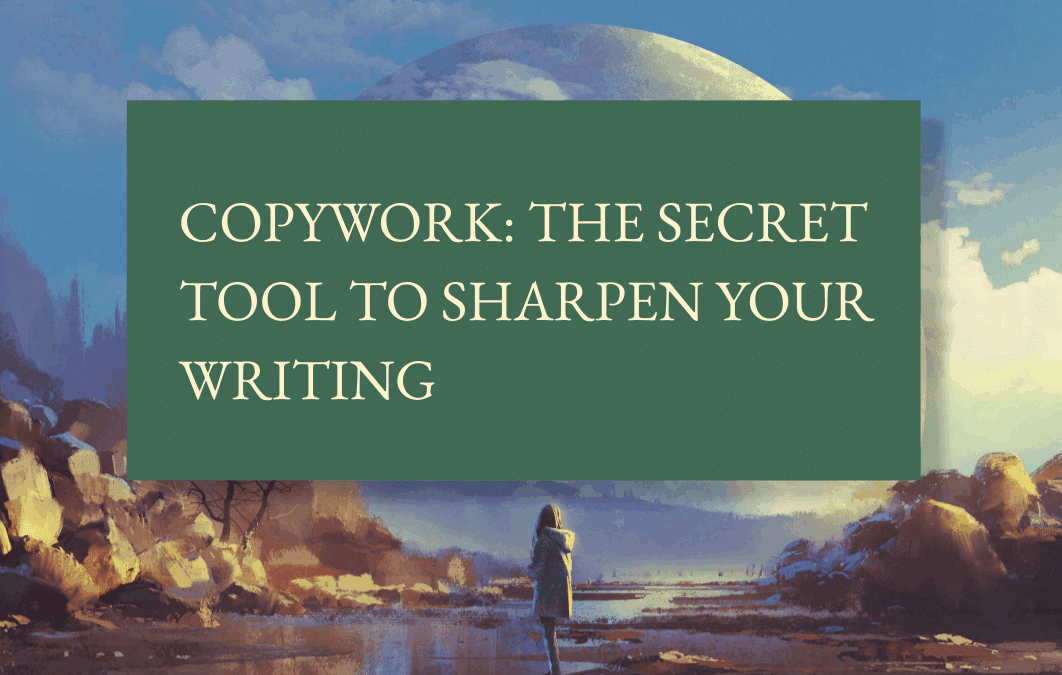Writing your heart out and studying craft books are great, but much of a writer’s education comes from paying attention when they read. One excellent way to practice and cultivate that close attention is copywork.
Copywork means carefully copying well-written texts to internalise the vocabulary, techniques, and rhythms of good writing.
The idea is to practice reading like a writer. This means slowing down your reading so you move beyond simply experiencing stories, instead observing what the author did to make them work. As an editor, I frequently recommend it to authors as one of the most effective ways to improve every aspect of their writing.
1. Choose a story you’ve already read.
You’ll be able to choose a passage more wisely because you already know the whole story. You’ll also focus on the words instead of spending all your attention just to figure out what’s going on. Pick something you genuinely enjoy reading, and make sure it’s similar to what you want to write.
Some recommend copying classics to ensure you’re learning from ‘good’ writing. I don’t think this is necessary unless you truly enjoyed the classic and it’s similar to what you like to write. Classics have a drawback, too – they sometimes model storytelling conventions that, while often beautiful, no longer resonate with as many readers as they once did. Spotting what does and doesn’t work in the current market takes discernment that beginners may not have yet.
Don’t overlook poetry. It’s highly useful if you want to work on craft aspects like metaphor, word choice, and atmosphere. Plus, poems are usually shorter than prose stories, so you get the satisfaction of copying the whole thing!
2. Choose a passage.
There are two main approaches to this, and you might use both:
- Look for a passage that moved or impressed you. When we think about stories we love, we often have specific ‘wow’ moments in mind. If a scene, paragraph, or even sentence made you think, ‘How did the writer do that?!’, it’s a great candidate for copywork.
- Look for a passage that shows excellence in a particular writing skill. Common skills to study include dialogue, description, action, opening and closing lines, exposition delivery, narrative voice, flashbacks, and introspection. If you know you struggle with description, for instance, think about moments in your chosen story where the author’s skill made it very easy to visualise (or hear, taste, smell, etc.) what was happening.
While savouring only your favourite passages might sound more fun, the skill-specific approach can help you avoid copying only passages that reflect skills where you’re already strong. For example, many writers who appreciate dialogue are already good at it (partly because they’re naturally attuned to it) and would benefit from doing copywork on their weaknesses, too. Aim for a variety.
3. Handwrite or type?
Short answer: Either works.
Longer answer:
Some prefer handwriting the passage they copy because it’s typically slower than typing (and the point of copywork, after all, is to slow down and pay attention). Plus, the tactile element lets them feel the shape of the words in a way typing doesn’t.
Others, especially those unused to handwriting, find it clunky and distracting. They prefer typing. Given that most of us do our writing on screens, they could also argue that absorbing the words in our natural writing habitat is more likely to make them stick, since we learn to associate the good writing we copy with the sensation of typing.
4. As you copy, pause and reflect.
There’s plenty to be gained from simply letting the words and their rhythm wash over you. But every few sentences or so, get analytical. Try asking yourself what specifically is working well about the passage. Is its atmosphere charged because of the author’s word choices (e.g. ‘the house brooded’ instead of ‘the house stood’)? Does its dialogue feel more authentic because the characters all speak differently from each other?
Ask also how the passage compares to your own writing or writing you enjoy less. When you notice a technique at work, make a note about how you could incorporate it into your next writing session, just as an experiment.
5. Stop when your mind isn’t processing the words anymore.
With copywork, little and often is better than long stretches if you’re forcing it. There’s not much point in continuing when your hands are doing the copying but your mind is elsewhere.
Since copying is, by definition, rote work, this might happen quickly for some. If that’s you, don’t worry. I’ve found that even a few minutes of copying can be enough to produce a takeaway that lingers in my mind by the next writing session. You’re still absorbing how good writing works and training your brain to pay closer attention when you read. If your copywork bursts tend to be very short, consider using them as a warm-up for your writing sessions.
Also, I don’t recommend grand ambitions of copying out a whole novel. Been there, done that, rarely got past the second chapter! (Hats off to you if you can do it, though.) Again, little and often is still beneficial.
With copywork, little and often is better than forcing yourself through long stretches. There’s not much point in continuing when your hands are doing the copying but your mind is elsewhere.
Since copying is, by definition, rote work, this might happen quickly for some. If that’s you, don’t worry. I’ve found that even a few minutes of copying can be enough to produce a takeaway that lingers in my mind by the next writing session. You’re still absorbing how good writing works and training your brain to pay closer attention when you read. If your copywork bursts tend to be very short, consider using them as a warm-up for your writing sessions.
Also, I don’t recommend grand ambitions of copying out a whole novel. Been there, done that, rarely got past the second chapter! (Hats off to you if you can do it, though.) Again, little and often is still beneficial.
Bonus step: Rewrite with your own words/ideas.
Is copying alone too rote? Do you want to take your copywork a step further? Try this exercise. Take a passage you’ve already copied (or even one you haven’t copied but would like to study) and use it as a template for a new snippet of writing. The snippet could be about something from your work in progress or something random. Choose a topic, then use the passage for inspiration.
For example, in the first sentence, you might use the first few words as a springboard for your own sentence. In the next sentence, you might change all the words but keep the sentence structure. In the next, you might replace the author’s simile with one of your own.
The idea is to let the passage inspire you to approach your own writing in ways you hadn’t considered – allowing the author’s voice to expand your own range. This is a great way to apply what you’ve learned from your copywork to your own writing and help it stick. You might impress yourself and end up with a new piece you like!
Kahina Necaise is the executive editor of Fabled Planet. She is also a content and line editor for its sister brand for historical fiction, The History Quill. When not editing, she can usually be found working on her own fantasy stories with ancient-history-inspired settings, reading, or going on walks while daydreaming about one of these things.
Do you write fantasy or science fiction?
Join our email list for regular writing tips, resources, and promotions.

